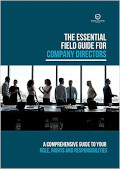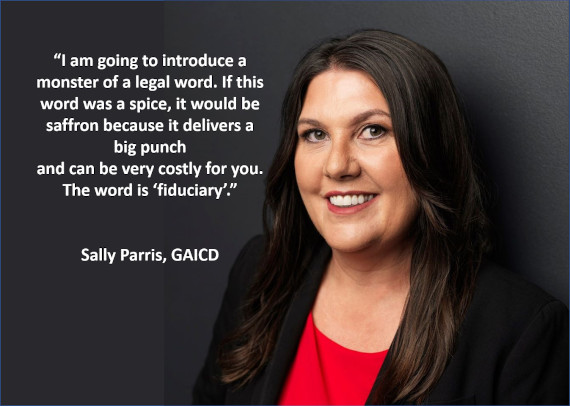|
|
|
|
|
|
|
|
|
Dear reader,
Welcome to the August 2020 edition of The Director's Dilemma. Each month this newsletter looks at a real-life scenario that happened to a board, perhaps to a board like yours, and considers a range of responses. The scenarios are de-identified to protect the individuals concerned.
Our dilemma this month looks at the courses of action available to a board that wishes to rise above the political cycle and implement a long-lasting solution to a pernicious problem. I hope that the judgement you develop through considering these dilemmas will assist you in fostering a positive impact as you progress your board career. If you are unsure how to benefit from this practical approach to gaining board skills, imagine that you are the Chair of Yvette's board and read the responses as if each were a contribution to the board's discussion. Can you combine them into a unified response, or do you have to choose between them? Can you imagine how you lead the board to a decision?
I have over twenty-two years' experience consulting to, and serving on, boards. It is a pleasure to share some of it with you in this newsletter and I would be even more delighted to share it with you when your board needs a performance review, strategy workshop, or director education session.
To read this email in a browser, go to www.mclellan.com.au/newsletter.html and click on 'read the latest issue'. I hope you are well and that you will enjoy the latest dilemma:

Yvette sits on the board of a government-owned company in the health sector. She chairs the people and strategy committee and loves to see the impact that her company has in improving lives.
The company is about to embark on an ambitious project that will involve a major capital project as well as diversification into a new service area. The project will be contentious. Evidence from overseas suggests that it will be highly beneficial for the targeted beneficiaries but that host communities will be anxious and even overtly hostile to the location of the service in their vicinity.
The international experience is all from well funded independent not for profit companies that could push ahead with planning amid controversy. Yvette is concerned that the project will straddle two electoral cycles and will rely on government funding in the early stages.
The executive team and the board are very excited at the potential for major social impact. How can Yvette help her board to develop a robust stakeholder management strategy that includes the shareholder and takes account of the political sensitivities that will inevitably arise?
|
|
|
|
Richard's Answer

There are three key pillars for any enterprise to consider as part of strategic deliberations - Reputation + Relevance = Revenue.
Yvette has a distinct challenge separating her duties as a director and her personal feelings. Does she strategize for growth contrary to government policy, or does she continue promoting the current services of the government enterprise?
This is a true dilemma, as Yvette identifies opportunity and promotes investment, without first acknowledging and assessing current government policy, contrary to her duties as a director.
As a director Yvette is required to meet five key responsibilities:
-
Governance - ensure the enterprise is viable, meeting its financial and reporting requirements.
-
Strategy - develop strategy in accordance with its articles of association.
-
Risk - assess threats to strategy, operations and board decisions.
-
CEO - appoint a Chief Executive Officer to implement strategy.
-
Public Relations - promote the brand.
Yvette is getting a little ahead of herself necessitating reflection on why the enterprise should enter a volatile market placing government reputation at risk. Is this an investment the government truly needs to be involved, as it will impact its reputation, relevance and future revenues?
The governance challenge within many government enterprises is the lack of strategic rigour assessing reason and risk toward operations to achieve positive revenue and reputation outcomes. Yvette needs to focus on current policy and then provide evidence-based reasons to government as to why a realignment of strategic direction is required. The government may agree with Yvette, but she first needs to ask.
Richard Evans is a Specialist Advocate, Former Federal MP and Peak Industry Executive with Malthouse Group. He is based in Melbourne, Australia.
|
|
|
|
Julie's Answer
 Yvette is alert to differences between an independent NFP and a government-owned NFP. That is a good start. She should know that the board, whilst ensuring that there is a strategy, need not get involved in the operational details. Yvette is alert to differences between an independent NFP and a government-owned NFP. That is a good start. She should know that the board, whilst ensuring that there is a strategy, need not get involved in the operational details.
She needs to consider some key questions:
-
Is the project within the objectives and aims stated in her board's enabling legislation?
-
Is the project clearly within the government's policy? What about the opposition parties' policies?
-
Is the project budget approved and included in government forward estimates?
-
Have her Minister and relevant others been briefed?
-
Have the local State and Federal elected representatives been briefed? Are they on the same party as the government?
-
Is the host community aware of the proposed project or is it still confidential?
-
Have management identified likely supporters and opponents and developed key messages for each?
Health and justice infrastructure can be viewed with suspicion by host communities. A well funded NFP can pursue a course of action even if vigorously opposed by the local community. Boards that report to an elected representative need to be very aware that the government of the day acts for the people of the electorate. A government business must build the support of all elected representatives and avoid placing the Minister in conflict with other members of the government. If the benefits are clear then support will be obtainable.
Finally the board needs to consider milestones, KPIs, and reporting, to discharge their duty of oversight as the strategy is implemented.
Julie Garland McLellan is a non-executive director and board consultant based in Sydney, Australia.
|
|
|
|
Veronica's Answer

What Yvette has to do, more than anything else, is remember that the view from 30,000 feet is very, very different than the view on the ground. In a situation such as this, political leaders can be helpful, but listening only to them and their opinions and guidance can lead you into an echo chamber and a false sense of security that you have the answers you need.
The board's stakeholder strategy here has to be centered around community engagement, particularly the constituencies being directly impacted. Politicians may say, “This will improve the lives of a lot of people,” only to find those “people” don't see it that way at all. (Exhibit A: Amazon's aborted plans to locate a second headquarters in New York.) How many well-meaning nonprofits have blazed a trail onto the continent of Africa, armed with promises and goodwill in terms of economic development, but failed because they never dug into the view of the citizens?
The board must be able to clearly and succinctly articulate how they think their project will improve stakeholders' lives, and show where their data and projections come from.
History can also serve as a guide. Find some case histories. What were some of the other proposed changes in this community that failed to materialize—and why? What is the culture like, and can the board show how this project fits into and enriches that culture? Addressing community concerns head-on—and issuing an assurance that you are in it for the long haul—is the only path to bringing this fruition.
J Veronica Biggins is a Director of Southwest Airlines and Managing Partner of Diversified Search for whom she chairs the Board of Directors Practice. She is based in Atlanta, USA.
|
|
|
|
Book Review – The Essential Field Guide for Company Directors by Sally Parrish
 "Curiosity is a key trait of highly effective directors” says Sally Parrish, GAICD, in this book. I must have it in spades because I was enthralled by this book and kept wanting to read just a bit more, and then another bit more. "Curiosity is a key trait of highly effective directors” says Sally Parrish, GAICD, in this book. I must have it in spades because I was enthralled by this book and kept wanting to read just a bit more, and then another bit more.
The book is refreshingly clear about the challenges and 'deadly dilemmas' that face directors in the practice of governance as opposed to the theory. When to fight, and when to run, and when to simply bide your time, are personal decisions that can be made easier by understanding the hard edges of the law and the blurred grey areas that lie within it. This book will expand your understanding. Not many authors dare to state the facts and difficult judgments so clearly and the result is a beacon to best practice.
Topics such as how to handle the death, or involuntary removal, of a director take the book from the realms of 'me too' parroting of guidelines into the practical 'what if' territory that directors inhabit. The visual of the layers and interactions of the Australian legal framework will enlighten and frighten in equal measure while the section on delegation comes with a useful warning that directors can breach their duties without having been involved in any breach. The "fine line between whether a written record is used to vindicate or incriminate” is shown in its twisted ambiguity while the clear message that shines through is that directors can and do provide value if they are diligent and proactive.
This book is a great addition to governance literature.
Available on amazon.com.
Julie's News - In July
I had a quiet month and enjoyed getting back to some face-to-face and hybrid board and shareholder meetings. I hadn't realised how much I loved meeting people until it became a mere memory! Director mentoring has now returned to predominantly in person settings and I was starting to anticipate travel when the threat of a second wave caused a pause in the march back to something closer to normal. Gyms in NSW have opened and I'm working off my frustrations and those dreaded 'covid kilos'.
I am always happy to help if your board has a need. Just call me on +61 411 262 470 or reply to this email for a discussion of how I might help your board.
Inspirational quote for August

A note on names - A few readers have asked me where I find the names for the protagonists in each case study; I 'borrow' them from people I meet or things that I read. Yvette is an old Franco-German name and means 'yew' or 'archer'. Our protagonist Yvette will need to aim clear and hit the mark if her board is to manage the delicate process of building political support for a controversial project.
This newsletter - If you have any ideas for improving the newsletter please let me know. If you are reading a forwarded copy, please visit my website and sign up for your own subscription.
Suggestions for dilemmas - Thank you to all the readers who have suggested dilemmas. They are greatly appreciated. I will answer them all eventually. I could not write this newsletter without your help and without the generous help of all the experts who respond each month to the case studies.
Be a contributor - If you would like to attempt a response to the dilemmas for publication you will be most welcome. Simply reply to this email and let me know.
Let's connect - I use LinkedIn to share information about boards and directorship with my friends and acquaintances. If you use LinkedIn and we are not yet connected I will welcome a connection from you. You can find me at linkedin.com/in/juliegarlandmclellan.
Let me help you - If you would like me to speak to or train your board, staff, audience and/or group please contact me at julie@mclellan.com.au.
Farewell until the next issue due 1 September 2020. I look forward to greeting you again then. In the interim I hope you will enjoy health, happiness and hard work: Enjoy governing your companies; we are privileged to do what we do and every day is a blessing!
Best regards,
Julie

Photo Credits: Personal images in this newsletter are provided courtesy of the contributors, course attendees and conference participants.
Disclaimer:
The opinions expressed above are general in nature and are designed to help you to develop your judgement as a director. They are not a definitive legal ruling and do not constitute legal advice. Names and some circumstances in the case study have been changed to ensure anonymity. Contributors to this newsletter comment in the context of their own jurisdiction; readers should check their local laws and regulations as they may be very different.
Privacy: I am privileged to have your contact details and keep them as safely as possible. I will alert you if they are ever accessed by any unauthorised person (the technical staff at ayuda help with publishing and issuing the Director's Dilemma and have access so they can send the newsletters to you). I do not sell your details to anyone; they are kept only for the intended purpose - sending you this newsletter and helping to build the judgement of company directors by providing a safe way to consider potential responses to real life events.
Main Photo by Markus Spiske from Pexels
|
|
|
|
|
|
|



 Yvette is alert to differences between an independent NFP and a government-owned NFP. That is a good start. She should know that the board, whilst ensuring that there is a strategy, need not get involved in the operational details.
Yvette is alert to differences between an independent NFP and a government-owned NFP. That is a good start. She should know that the board, whilst ensuring that there is a strategy, need not get involved in the operational details.


